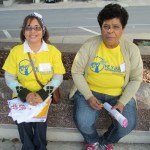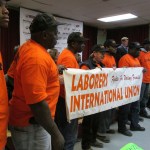occupational safety
Three years ago today, April 5, 2010, at approximately 3:02 pm (ET) a coal dust explosion ripped through Massey Energy's Upper Big Branch mine in southern West Virginia. Twenty-nine miners were killed by the blast, suffering fatal injuries from the explosion itself or from carbon monoxide poisoning. They were:
Carl Calvin "Pee Wee" Acord, 52
Jason Atkins, 25
Christopher Bell, 33
Gregory Steven Brock, 47
Kenneth A. Chapman, 53
Robert E. Clark, 41
Cory Thomas Davis, 20
Charles Timothy Davis, 51
Michael Lee Elswick, 56
William "Bob" Griffith, 54
Steven "Smiley" Harrah, 40…
by Kim Krisberg
Texas construction workers who've lost their lives on unsafe worksites may be gone, but they certainly haven't been forgotten. Earlier this week, hundreds of Texas workers and their supporters took to the streets to demand legislators do more to stop preventable injury and death on the job. They took their demands and the stories of fallen workers all the way the halls of the state capitol.
Just two days ago, workers from every corner of the Lone Star state made their way to Austin to take part in the Day of the Fallen, a day of action to memorialize construction workers…
by Kim Krisberg
For many migrant farmworkers, the health risks don't stop at the end of the workday. After long, arduous hours in the field, where workers face risks ranging from tractor accidents and musculoskeletal injuries to pesticide exposure and heat stroke, many will return to a home that also poses dangers to their well-being. And quite ironically for a group of workers that harvests our nation's food, one of those housing risks is poor cooking and eating facilities.
A group of researchers and advocates recently decided to take a closer look at such facilities among migrant farmworker…
by Kim Krisberg
After nearly three decades as a USDA food safety inspector, Stan Painter tells me he now feels like "window dressing standing at the end of the line as product whizzes by."
Painter, a poultry inspector with the Food Safety and Inspection Service (FSIS) stationed in the northeast corner of Alabama in the town of Collinsville, is a first-hand witness to USDA's recently proposed rule to speed up poultry inspection lines while simultaneously reducing the number of federal food inspectors and turning over much of the food safety oversight to plant employees, who could have little…
It's one thing to say your agency is committed to environmental justice, but actions speak louder than words. That's why I'm eager to see how USDA Secretary Tom Vilsack and his Food Safety Inspection Service (FSIS) respond to the environmental justice concerns raised about the agency's proposed regulation to "modernize the poultry slaughter inspection system" (77 Fed Reg 4408.)
A disproportionate share of workers employed in poultry slaughter and production are Latinos and women. Many earn poverty-level wages. Their work environment----which is already associated with…
Greg Byers, 43, worked underground at Arch Coal/ICG's Pocahontas Coal Mine in Beckley, WV. On the afternoon of July 31, 2012, he suffered a serious crushing injury. He died later that day.
Byers was a U.S. Marine who'd been working as a coal miner for five years. His employment at the Pocahontas mine, which employs nearly 300 workers, began about a year earlier. His job was "scoop operator." He used a hefty vehicle to scoop up the loose coal from the mine floor after the mining machine had done its work. When there's no coal to scoop, the equipment operator…
by Kim Krisberg
Texas may boast a booming construction sector, but a deeper look reveals an industry fraught with wage theft, payroll fraud, frighteningly lax safety standards, and preventable injury and death. In reality, worker advocates say such conditions are far from the exception — instead, they've become the norm.
Such conditions were chronicled in a new in-depth report released earlier this week. Researchers, who surveyed nearly 1,200 construction workers in Dallas, San Antonio, Houston, Austin and El Paso, found that one in five construction workers experienced a workplace injury…
[Updated below (6/24/2013)]
The Huffington Post's Dave Jamieson has a story today from the Kentucky coal fields that has my head shaking in disbelief. Reuben Shemwell, 32, says he was fired by Armstrong Coal after complaining about safety problems, including asphyxiation hazards and inappropriate respirators. As provided by the federal Mine Act (Section 105(c)), Shemwell filed a complaint with the U.S. Labor Department's MSHA for wrongful discharge. Now he finds himself being sued by his former employer in Kentucky state court. Armstrong Coal claims that Shemwell…
In the month's preceding the deadly explosion in April 2010 that killed 29 coal miners, Massey Energy's Upper Big Branch (UBB) mine had racked up hundreds of serious violations of safety standards. In 2009 alone, this included 48 orders from federal mine inspectors to withdraw workers from the UBB mine because of dangerous conditions. But Massey knew how to game the system. Mine managers would make a couple tweaks, correct the immediate problem, and it was back to mining coal. usually within an hour or so. There was no real consequence for their or other mine…
We commemorate today the life of Reverend Martin Luther King, Jr., the inspirational civil rights leader who was assassinated at age 39 in Memphis, Tennessee on April 4, 1968. Rev. King was visiting Memphis to support hundreds of city sanitation workers in their demands for safer working conditions and dignity on the job.
Martin Luther King Jr.
In an interview taped for the StoryCorps project, Mr. Elmore Nickelberry and Mr. Taylor Rogers describe their experience as Memphis sanitation workers in 1968.
Taylor Rogers: "Our day was awful. Everyday. We had these tubs…
by Kim Krisberg
"To know you participated in building something in your city — it's just an experience, you know?"
Those are words from Austin, Texas, native Christopher McDavid, 22, a graduate of the city's newly established Construction Career Center. During his time at the center, McDavid got certified in flagger safety (flaggers direct the safe passage of traffic through construction areas), first aid and CPR, and basic concrete work and received his OSHA 10 certification, which he said "has opened my eyes to actually see the things that can be harmful to me."
Now, McDavid is looking for…
In the weeks ahead, President Obama will announce his pick to replace Hilda Solis as the 26th Secretary of Labor. It's the Cabinet-level position with the resources and best platform to promote strong policies for the benefit of U.S. workers----from fair, living wages and safe working conditions, to job training and family leave benefits. I hope the President's nominee takes the time to read "At the company's mercy: Protecting contingent workers from unsafe working conditions," a new report by the Center for Progressive Reform (CPR). It describes how work arrangements…
by Kim Krisberg
Dr. Paul Demers says he frequently finds himself having to make the case for why studying workplace exposures to carcinogens is important. Oftentimes, he says, people believe such occupational dangers are a thing of the past.
"A lot of people are still developing cancer and dying from cancer due to workplace exposures, but only a small fraction of those are compensated, so people may think the magnitude of this problem is small," said Demers, director of the Occupational Cancer Research Centre in Ontario, Canada. "I wanted to have better data."
And in just a few years, he will…
Last week, my home State of Michigan became the 24th one to enact "right-to-work" legislation. I'm sure the great labor leader Walter Reuther (1907-1970) rolled over in his grave when Michigan Governor Rick Snyder signed the anti-union bill into law.
Workers coming together to negotiate for better wages, benefits and working conditions created the middle class in America. Belonging to a union means workers can be more secure that they won't be fired arbitrarily, and have more power to receive skills training and guard against unsafe working conditions. This latter point is…
by Kim Krisberg
Workers in Travis County, Texas, are celebrating what advocates are calling a landmark victory, after local leaders voted to ensure that economic incentive deals benefit both big business and workers.
In late November, Travis County commissioners approved a new living wage requirement for companies wanting to move into the county and take advantage of the generous tax breaks the region offers to lure new business. The requirement creates a new wage floor of $11 an hour for all employees, including construction workers. On the same day as the county vote, a committee of the…
by Kim Krisberg
The collective experience of domestic workers — house cleaners, nannies and caregivers — often remains hidden from view. For all practical purposes, they work in regulation-free environments without the benefits of labor, wage and health protections or oversight. There are no HR departments in people's homes.
But a new survey released in November has pulled back the curtain on the conditions and experiences domestic workers face, documenting issues such as wage exploitation, preventable on-the-job injuries and the little — if any — power domestic workers have in improving…
Shortly after taking office, the head of the Labor Department's Occupational Safety and Health Administration (OSHA) acknowledged the troubling slow pace at which new worker safety regulations are put in place. In a February 2010 speech, David Michaels, PhD, MPH said:
"Some standards have taken more than a decade to establish, and that's not an acceptable response when workers are in danger."
In a March 2010 speech the OSHA chief added:
"Clearly the current system for issuing standards doesn't work well for those it's supposed to benefit - workers. When rulemaking takes years…
Hurray! The Presidential election is over. Let's hope this means that Obama Administration officials will come out from under their beds and embrace their regulatory authority to issue some strong public health and environmental regulations. At the Labor Department (DOL) there's much work to do to expand workers' rights, ensure workers' lives and health are protected, and improve the information provided by its agencies. Leave a comment with your ideas for immediate action by the Labor Department.
Here's my short version of my wish list for major DOL activities for the next…
For some reason the news story stuck in my memory. The headline read:
"Oil rig explosion near Marshall in north central Oklahoma was caused by blowout, company attorney said."
Maybe it was because I'd been reading so many stories about the natural gas boom, that a news story about an oil rig caught my attention. It happened January 20, 2012 at the Logan Rig #7, operated by El Dorado Drilling, an affiliate of Kirkpatrick Oil. Maybe it was the news headline's word "blowout" which stirred memories of the Deepwater Horizon Maconda rig's infamous "blowout preventers."…
by Kim Krisberg
It really is a chemical world, which is bad news for people with asthma.
According to a recent report released in August, at this very moment from where I write, I'm fairly surrounded by objects and materials that contain chemicals that are known or suspected asthmagens — substances that can act as asthma triggers if inhaled. There's formaldehyde (it's in office furniture, wood flooring, curtains and drapes); maleic anhydride (it's in interior paint and tile flooring); hexamethylene diisocyanate (it's in metal storage shelving and decorative metal); and diisodecyl phthalate (…

